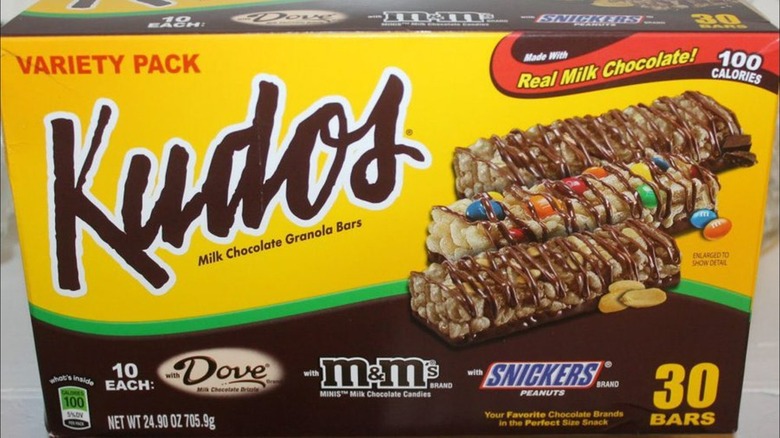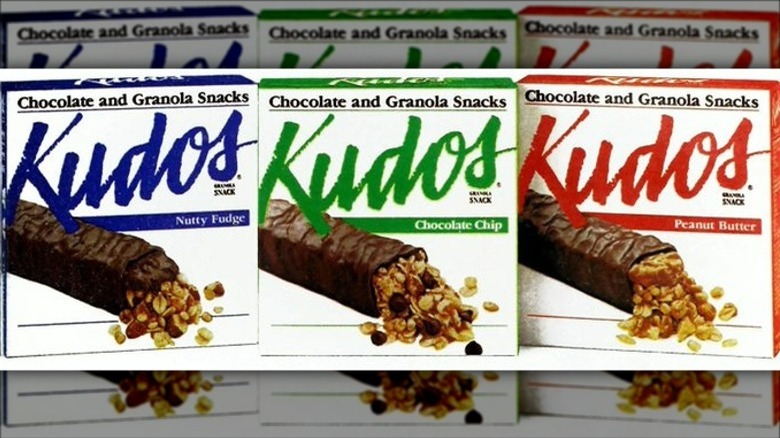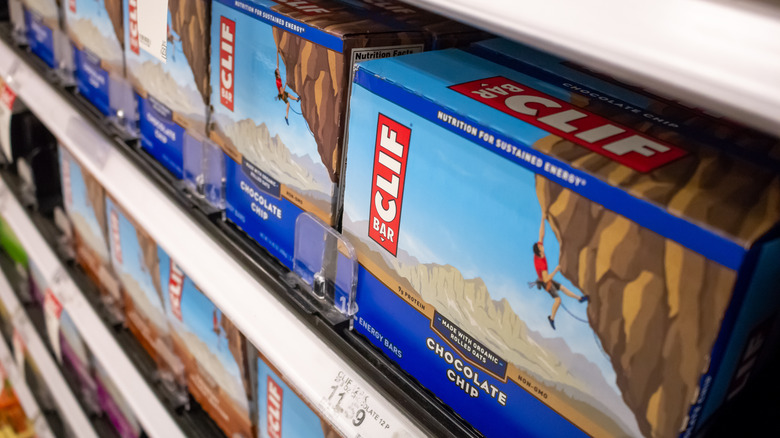The Reason Kudos Snack Bars Were Discontinued
Kudos snack bars were a delight as a child. Parents thought the chocolate-laden bars were healthy, but they sure didn't taste like it. It seemed to be a product that served two masters, but that may have factored into why they were eventually discontinued like so many other snacks from the 1990s.
The Mars candy conglomerate introduced the world to Kudos bars in 1986, and it wasn't long until they were enjoying a windfall of sales throughout the 90s. The three original varieties Kudos offered customers were Chocolate Chip, Peanut Butter, and Nutty Fudge with a limited number of calories, but the "granola bars" were covered in chocolate, which seemed to discredit any claims about them being good for you. This triggered the Spidey senses of parents across the U.S., thinking that perhaps these granola treats advertised as healthy snacking options weren't exactly what they seemed.
To combat the withering support for their product, Mars introduced "Simply Kudos" in 1993. These modest versions of the original Kudos were stripped of their beloved chocolate coating and advertised a modest calorie count of 100 per bar. The move may have righted the Kudos ship for a time, but once they partnered with other Mars brands for a variety of flavors, the end was nigh. In 2011, Kudos released snack bars housing candies like M&Ms and Snickers, and by 2017, Kudos was discontinued without an official statement as to why from the company.
The discontinued snacks wanted to have it all
The Mars company tried to simultaneously niche itself into the hearts and minds of parents across the country by advertising its product as nutritious while appealing to children who really just wanted a candy bar. Consequently, they fell out of favor with both crowds. Those wanting a bite of something delicious thought, "Oh, health food? No thanks." Meanwhile, folks who were health conscious were having a hard time believing the quick bites were anything but over-glorified sugar bars.
While Kudos may have marketed itself as a health food, the devil laid in the details. They weren't particularly calorie-laden, with only 120 calories per bar in its Chocolate Chip flavor, but there wasn't much else in the sense of substance in the product that justified them being marketed as a nutritious snack. Sure, they had granola, but they only contained one gram of protein and fiber, which contrasts with more substantial snack options like a Fiber One bar, which has two grams of protein and nine grams of fiber.
With competing merchandise emerging onto the market, Mars struggled to keep its grip on the health-conscious demographic, which ultimately led to the eventual disappearance of a beloved snack food, not unlike the McDonald's snack wraps.
Kudos discontinued as competitors succeeded
It is possible to make a snack bar with flavor appeal that also satisfies those looking for substantial protein and fiber. Clif bars started popping up on store shelves soon after launching in 1992, and although there are some compelling flavors designed to charm the taste buds, the company never lost sight of its target market: people looking for a quick influx of energy. While a Chocolate Chip Clif bar contains double the calories of its Kudos counterpart, it also boasts four grams of fiber and 10 grams of protein.
Kind bars have also long been billed as a nutritious snacking option to keep folks going throughout the day. They also include more calories than Kudos, but they hold seven grams of fiber and six grams of protein — as well as calcium, iron, and potassium — in the Dark Chocolate Nuts & Sea Salt flavor. Ironically, after discontinuing its own product, the Mars company climbed back into the healthy snack game by acquiring the Kind brand in 2020.
Of course, all of these companies want to convey to customers that their products taste good, but they focused their marketing efforts on how good they are for you, something Kudos never succeeded at. While it strived to make the snacks appeal to children, it failed at advertising its goods as nutritious. The company tried to have its cake and eat it too, and as a result, it went the way of Tab Soda, unlikely to be seen on store shelves ever again.


